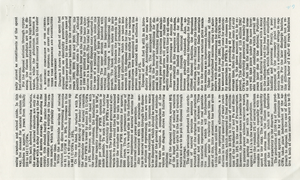Search the Special Collections and Archives Portal
Search Results
Walking Box Ranch Collection
Identifier
Abstract
The Walking Box Ranch Collection (1917-2011) includes material collected by the University of Nevada, Las Vegas (UNLV) Public Lands Institute on the Searchlight, Nevada ranch. Materials include a maps related to the construction and operation of the ranch, a pair of chaps owned by Rex Bell, Jr., and color slides of the ranch. Also included are photographic prints of Rex Bell and Rex Bell, Jr., and newsclippings related to the film and political career of Rex Bell. A small number of newsclippings pertain to the career of Rex Bell, Jr.
Archival Collection
Flora Dungan Papers
Identifier
Abstract
Flora Dungan Papers (1929-1974) contain high school and university records, certificates, newspaper clippings, press releases, notes, correspondence, and booklets about her life and political activism in Nevada. Also included are Legislative materials, an audio cassette tape, a copy of the Nevada Constitution, and an oil painting of Flora Dungan.
Archival Collection
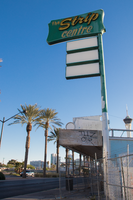
Photographs of Strip Centre sign, Las Vegas (Nev.), March 24, 2017
Date
Archival Collection
Description
Sign owner: Has been for sale since 2013
Sign details: This location has is a little shopping mall, and is called the strip centre since they are near the north end of the strip. Though this location has been up for sale since 2013.
Sign condition: 3- has had some bad weathering over the years and the paint is quite faded now.
Sign form: Blade
Sign-specific description: This sign stand on top of the building above the entrance. It is a green base that reaches the top of the sign. On the top part there is a big green steel rectangle with yellow painted words "The Strip Centre" but the word "Strip" is contained in channeled neon while the other two words are skeletal neon. Beneath this is 3 green sign boxes that would contain back lit plastic signs, but there are no signs in them currently. To the south side of the main sign there are remains of a sign that look like it used incandescent light bulbs.
Sign - type of display: Neon and plastic back lit signs.
Sign - media: Steel and plastic
Sign - non-neon treatments: Plastic back lit portion
Sign environment: This location is on the north end of the strip. It is north of the Stratosphere by a few blocks but also has some motels and wedding chapels close to it.
Sign - date of installation: Has been up since at least 2009
Sign - thematic influences: The plastic back lit portion is helpful for malls like this since they can change out which stores are within the mall relatively easily without getting a whole new sign.
Survey - research locations: Google map roadside view, attempted assessor's page but could not find it
Survey - research notes: This location was hard to find information on since it is for sale. Also I could not find information on it the assessor's page for some reason.
Surveyor: Emily Fellmer
Survey - date completed: 2017-10-01
Sign keywords: Neon; Plastic; Backlit; Steel; Pole sign; Back to back
Mixed Content

Transcript of interview with Robert L. Skaggs by Dr. David Emerson, May 06, 2006
Date
Archival Collection
Description
Text
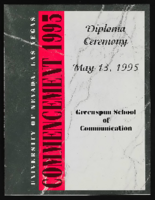
University of Nevada, Las Vegas (UNLV) Greenspun School of Communication Diploma Ceremony program
Date
Archival Collection
Description
Commencement program from University of Nevada, Las Vegas Commencement Programs and Graduation Lists (UA-00115).
Text

University of Nevada, Las Vegas (UNLV) 42nd commencement, Nevada State College 4th commencement program
Date
Archival Collection
Description
Commencement program from University of Nevada, Las Vegas Commencement Programs and Graduation Lists (UA-00115).
Text
Fallman Family Papers
Identifier
Abstract
The Fallman Family Papers (approximately 1950-2005) consist of correspondence, newspaper clippings, photographic prints and slides, scrapbooks, and pamphlets from James and Ima Fallman and their daughter, Janice. The correspondence primarily relates to James and Ima Fallman and chronicles Ima's involvement with the Francisco Garces chapter of the Daughters of the American Revolution (DAR), James's work as a bartender in Las Vegas, Nevada, and awards he received during World War II. The newspaper clippings mention either James Fallman or his daughter, Janice, and her involvement with the Las Vegas High School Rhythmettes dance team. The majority of materials from Janice describe her school days at Las Vegas High School and events participated in as a child and young adult.
Archival Collection
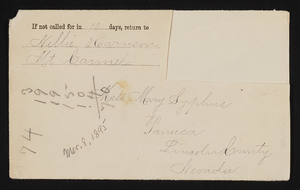
Letter and envelope from Nellie Harrison, Mt. Carmel to Mary Etta Syphus, Panaca, Nevada
Date
Archival Collection
Description
From the Syphus-Bunker Papers (MS-00169). The folder contains an original handwritten letter, a typed transcription of the same letter, the original envelope with the stamp removed, and a copy of the original letter.
Text
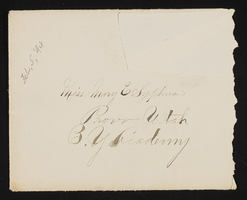
Letter and envelope from John M. Bunker, Logan, Utah. to Mary Etta Syphus, Provo, Utah
Date
Archival Collection
Description
From the Syphus-Bunker Papers (MS-00169). The folder contains an original handwritten letter, a typed transcription of the same letter, the original envelope with the stamp removed, and a copy of the original letter.
Text

